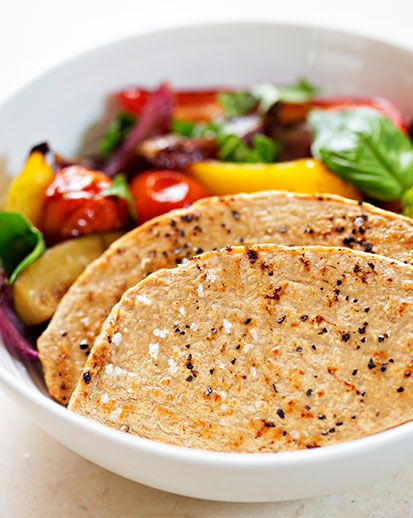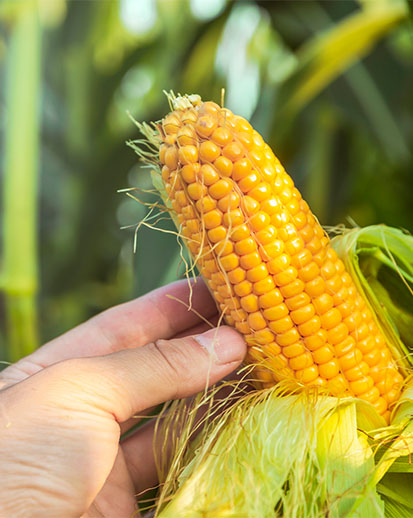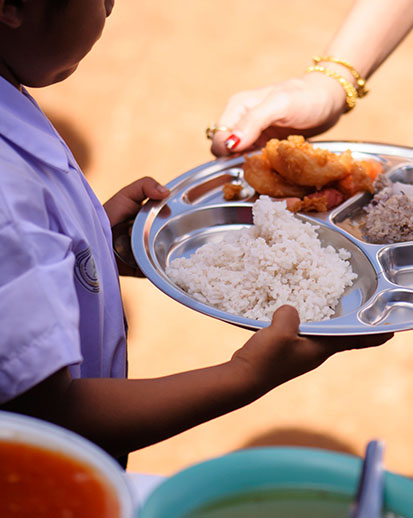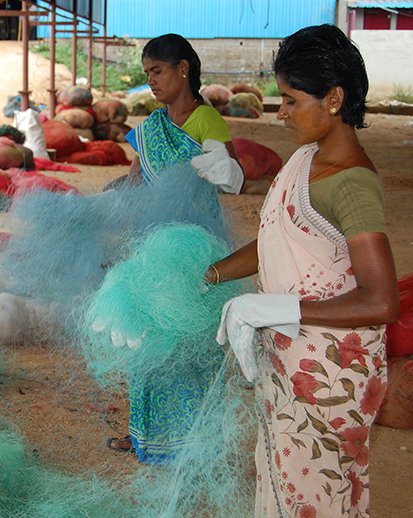Nutrition & Health initiatives
The DSM Malnutrition Partnerships and Programs (MPP) team addresses malnutrition through public-private partnerships, while strengthening our consumer-oriented new business model ‘Programs in Emerging Markets’. Through our partnerships, we learn about effectively creating impact for vulnerable and last-mile population groups. These learnings drive our innovation efforts to create new solutions that address the needs of consumers in emerging and previously underserved markets. In addition, MPP offers opportunities for talent development through exchange programs. In 2021, 11 DSM employees worked as long-term secondees or on a (part-time, virtual) consultancy project for our partners, benefiting from unique opportunities for personal and professional development.
UN World Food Programme (WFP)
The DSM-WFP partnership ‘Improving Nutrition, Improving Lives’, in place since 2007, aims to improve the nutritional value of the food that WFP distributes. Together, we reached 30 million direct beneficiaries in 2020 (the most recent reporting period) with food improved by the DSM-WFP partnership. We have made significant strides in the partnership’s efforts in scaling up fortified rice, both through retail channels and in social safety nets. Specifically, the partnership contributed to substantially scaling up the availability of fortified rice globally, from reaching 3.8 million in 2018 to 15 million people in 2020.
Equally important, the partnership programs create long-term systemic impact by raising awareness of the importance of nutrition while continuing to develop new scientific and technical solutions. For example, in 2021, 11 so-called DSM X-Changers worked on temporary assignments with WFP using their expertise in the fields of (social) marketing, business case development, packaging, quality assurance and (sales) data analysis. Accordingly, within the current Memorandum of Understanding for 2019–2021 (under renewal for 2022), the partnership is prioritizing rice fortification as a proven and cost-effective solution for combating malnutrition, with our partnership’s activities supporting 15 countries globally. Additionally, the humanitarian organization is moving toward cash-and-voucher systems as a long-term strategy. The partnership continues to support WFP to empower consumers to improve their own nutrition and diets.
UNICEF
Since 2013, UNICEF, DSM, and Sight and Life have partnered to improve nutrition for women and children. Built on multiple pillars, the partnership aims to expand the scientific evidence base and operational proof of viability of targeted nutritional interventions; to increase awareness of the importance of good nutrition; and to make nutritious food products accessible to those who need them most.
Creating enabling environment and scaling up micronutrient powder uptake
In Nigeria, the partnership focused on providing an enabling environment for the uptake of micronutrient powder (MNP) and supported the Government of Nigeria in realizing its vision of scaling up the MNP program nationally from five to ten states, reaching three million children aged 6–23 months suffering from malnutrition. The program added Multiple Micronutrient Supplements (MMS) for pregnant and lactating women and integrated MNP guidelines into the national standards in Nigeria. Additionally, the partnership resulted in increased commitment by both private and public actors in Nigeria to improve the access to nutritious foods for young children, through engagement with the SUN Business Network.
The Social Movement on Nutrition program
The partnership expanded to India by supporting the UNICEF engagement of private-sector stakeholders as part of the Indian government’s Social Movement on Nutrition program. The collaboration focuses on mobilizing the private sector around nutrition literacy, through the platform Impact4Nutrition (I4N), which was established in March 2019. In 2021, the platform, which won an internal UNICEF INSPIRE award and AVPN prize, has more than 200 companies on board.
Addressing agri-food business development
Furthermore, this partnership was expanded to address agri-food business development as part of an opportunity identified by Generation Unlimited (GenU), within the United Nations Secretary General’s Youth 2030 Strategy. The key objective of this expanded cross-sectoral partnership is to embed a longer-term vision for Sustainable Food Systems (GenU SFS) in Africa; develop a business plan to attract young people to the agri-food value chain, in an effort to boost youth employment in Africa; and build an enabling environment along the agri-food sector conducive to thriving, sustainable and inclusive business.
World Vision International
Our partnership with World Vision and Sight and Life, with the slogan of ‘Joining Forces for Last-Mile Nutrition’, aims to bring prosperity and good nutrition to the most vulnerable communities in the Global South. Leveraging the unique capabilities and know-how of each partner, we design and implement sustainable market-based solutions that bridge the gap between public and private efforts for improving nutrition and fostering local economic development. For example, the partners worked on solutions for maize in Rwanda, eggs in Indonesia and Ethiopia, distribution channels in Brazil, and MMS in the Philippines.
The maize value chain in Rwanda
In Rwanda, the partners enable transformation of the local maize value chain, ensuring a more efficient, inclusive and sustainable supply chain. Partners work with and enable smallholder farmers through training and market access, while working on improving the quality of, and access to, raw materials for Africa Improved Foods (AIF) in Rwanda. After positive results of the initial pilot, the partners are now collaborating for scale-up. More than 31,000 children and almost 20,000 women benefit from AIF’s Super Cereal product as part of World Vision Rwanda’s COVID-19 response.
The EGGciting project
The EGGciting project in Indonesia focuses on eggs as an important source of nutrition and works to increase the availability, accessibility, and consumption of eggs at the household level in Sulawesi (Indonesia). Partners address bottlenecks in the supply chain and improve the quality of feed, while driving demand on the consumer side for improved nutrition by use of social marketing that stimulates the consumption of eggs as a nutritious product.
Building on the success of the EGGciting Indonesia project, the partners brought the EGGciting model to three regions in Ethiopia; Boset, Shaheme, and Bui. The program focuses on training small and medium poultry farmers in farm operation and feed management for improved nutrition, safety, quality, sustainability, and livelihoods. Simultaneously, the program aims to increase the accessibility to eggs and the understanding of their nutritional value, especially for women and children.
Social distribution of nutrition in Brazil
In Brazil, market research to support the social distribution of nutritional products started in 2019. This pilot continued throughout 2021 and is projected to transform the distribution of micronutrient-enriched products in Brazil by incubating last-mile nutrition female entrepreneurs to serve populations living in vulnerable communities through a door-to-door business model. In 2021, Products were formulated and designed and an initial group of 200 women participated in workshops about nutrition and entrepreneurship.
MMS in the Philippines
In the Philippines, the partners launched a new program focusing on the MMS value chain for pregnant and lactating women in the Albay, Camarines, and Zamboanga del Norte regions. The program builds on the momentum behind MMS after its inclusion in WHO’s essential medicine list. It aims to increase the availability and access to MMS, ensure adequate demand and use, and further encourage policy reform to include MMS.
Africa Improved Foods (AIF)
AIF is an African social enterprise that produces fortified foods made mainly from maize and soybean sourced from over 130,000 smallholder farmers in the region. These products include mineral- and vitamin-rich porridges and help meet the nutritional needs of vulnerable population groups such as pregnant and breastfeeding mothers, older infants, and young children. AIF addresses the food challenges facing Africa by building resilient food systems through sourcing, manufacturing, and selling nutritious, affordable, and accessible products. AIF was launched in 2016 in Rwanda as a public-private partnership between the Government of Rwanda and a consortium comprising DSM, the Dutch Development Bank (FMO), DFID Impact Acceleration Facility managed by CDC Group plc (CDC), and the International Finance Corporation (IFC), the private-sector arm of the World Bank Group.
A study executed by the University of Chicago shows that AIF delivers true value – improving the livelihoods of smallholder farmers, employees and their families, improving food safety, reducing malnutrition and contributing to broader development. The AIF intervention is expected to contribute over USD 1 billion to the regional economy over a 15-year period.
AIF’s Kigali factory contributes to the local and regional economy
AIF’s mission is to produce high quality nutritious foods from local ingredients. Already working with 45,000 smallholder farmers in Rwanda, to improve their productivity and quality and are scaling this further with partners. Focused on developing robust value chains that address the challenges of climate change and employment creation in the African food value chain.
AIF’s Kigali factory employs over 300 skilled workers with well-paid jobs. Regional procurement of goods and services (such as transportation) has led to indirect economic development across East Africa. With a reach of over 1.6 million consumers daily, AIF has proven that this model can be profitable while contributing to SDG 1 (No Poverty), SDG 2 (Zero Hunger) and SDG 13 (Climate Action).
Positive results in 2021 despite the pandemic
Despite COVID-19, revenue grew to more than USD 60 million in 2021, as the need for humanitarian nutritious food supply continues to be high. Business-to-consumer sales grew significantly as the Nootri brand (comprising a range of fortified porridges) continued to gain popularity across East Africa. The year also marked the beginning of AIF’s new ambitious growth strategy, with groundwork in Ethiopia and Kenya to accelerate and further scale up AIF’s impact.
MANDI
In 2021, we continued to expand MANDI (Making A Nutritional Difference to India), a socio-commercial consumer products business delivering local nutrition and home fortification solutions that are affordable and convenient. The range of home fortification products involved, branded as NuShakti™, includes solutions for staples such as rice and wheat flour, as well as fruit-flavored fortified beverage powder and vitamin enriched candies – all of which have a base immunity benefit. The business aims to build education about the importance of health, nutrition and immunity, with the aim of tackling widespread malnutrition in India. Since its start in the third quarter of 2019, the business has faced two rounds of pandemic shutdowns for more than seven months, causing huge disruptions in systematic build-up. In 2021, Nu-Shakti™ products were distributed in four southern states in India in leading modern trade and grocery outlets.
Partners in Food Solutions (PFS)
PFS works to increase the growth and competitiveness of food companies in Africa. These aims are achieved by inspiring business leaders and linking highly skilled corporate volunteers from a consortium of leading companies including DSM, Cargill, General Mills, Hershey, Bühler, Ardent Mills, and J.M. Smucker Company with promising entrepreneurs and other influencers in the food ecosystem. The seven corporate partners have empowered hundreds of entrepreneurs to work toward stronger, more resilient food value chains across the African continent.
In 2021, DSM employees contributed over 1,240 volunteer hours, working with 52 African clients across 11 countries. By sharing expertise, the volunteers were able to assist local entrepreneurs in growing their businesses and supporting a supplier base of more than 102,600 farmers. In total, 62 DSM volunteers supported 67 service offerings to clients, of which 15 clients are owned or managed by women.
Scaling Up Nutrition (SUN)
The SUN Business Network (SBN) — co-hosted by the Global Alliance for Improved Nutrition (GAIN) and WFP — is the private-sector branch of the SUN Movement. It aims to support businesses in growing the role they play in nutrition and to support SUN countries in developing national business engagement strategies. The SBN is established in 18 countries and supports the development of new networks in 26 countries. These include almost 1,400 companies, mostly small and medium-sized enterprises. The global membership platform currently has 25 members, who have a combined workforce of over 1.1 million employees. Our Honorary Chairman Mr. Feike Sijbesma is a member of the Lead Group of the SUN Movement and Co-Chair of the Advisory Group of the Network. Our Vice President Malnutrition Partnerships and Programs is on the Operations Committee of the SBN.
Supporting SBN projects in Africa
We supported several SBN projects focusing on Sub-Saharan Africa. Together with the SBN global team, we built on the impact and energy of the first ever Nutrition Africa Investor Forum (NAIF) which reframed the dialogue around nutrition and supported the Global Pitch Competition 2020. As an SBN global member, we support the implementation of SBN principles, notably around workforce nutrition commitments; overweight, obesity and diet-related non-communicable diseases; and the delivery of technical assistance to national SBNs and their members. We advocate for business to take a leading role in these important issues and collaborate with SBN for stronger business accountability on nutrition and for the adoption of SMART nutrition pledges by business (UN Food System Summit, Nutrition for Growth Summit).
Sight and Life
As a global leader in nutrition, the Sight and Life Foundation uses science to change the way nutrition is delivered to people who need it most, specifically women and children.
With the support of DSM, Sight and Life delivers value by translating science into effective nutrition programming, building public-private partnerships, and developing viable social business models for affordable and nutritious foods.
In 2021, Sight and Life launched the Nutrition in City Ecosystems (NICE) project, a Swiss consortium with the Swiss Tropical and Public Health Institute, ETH Zürich, and Syngenta Foundation and supported by the Swiss Agency for Development and Cooperation. NICE aims to increase long-term access to and demand for nutritious foods produced via local and agroecological systems in Bangladesh, Kenya and Rwanda.
Through a long-term partnership with DSM and the World Food Programme, Sight and Life continues to create demand for nutritious and affordable food for women in Ghana via the OBAASIMA seal. Together with DSM, Sight and Life increases supply and demand for more and better eggs to populations at risk of nutritional deficiencies in Africa and Latin America.
This year also brought new publications and virtual events focused on key themes, including nutrient profiling, multiple micronutrient supplementation, adolescent nutrition, food systems, and the impacts of climate change on nutrition, sharing science-based evidence and expert knowledge. For more information, visit: sightandlife.org.





